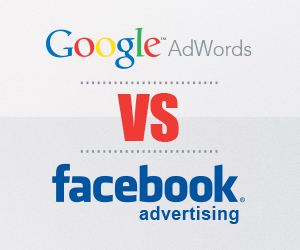A difficult question for new advertisers is: which traffic source should I use, Google or Facebook? Depending on your business model and objective, placing your money in the right place is crucial so that you minimize loss, maximize reach, and increase conversions.
Before we get into which is the best choice for your business, let’s go over each one.
What does each platform offer?
Google offers one of the most versatile platforms available in Adwords. This includes search advertising via their Google Search Network and display advertising via Google Display Network.
Google Search Network (GSN) uses search queries to display relevant ads to the user on Google search results pages (SERPs). GSN can also extend its reach by including the search query to their search partners, a list of hundreds of non-Google websites. GSN works on a cost-per-click or CPC model for contextual ads, so you only pay when someone clicks on your ad.
Google Display Network (GDN) allows you to place your ads across a wide variety of sites such as YouTube, Blogger, and Gmail, as well as 2 million other websites. GDN primarily works on a cost-per-thousand views orCPM model ; unlike the CPC model if your ad is not relevant to the viewer you can spend a lot of money very quickly without meeting your objective.
Facebook Ads enables advertisers to place ads via their social media platform. Targeting capabilities have evolved greatly over the last few years; starting with Interest and Fan targeting to now more advanced methods such as Custom Audiences and Website Custom Audiences, which allow you to retarget people on Facebook who subscribe to your email list and visit your website. Facebook cost models range from CPC and CPM to cost-per-action (CPA), cost-per-lead (CPL), and others.
When should you use a Search Network or a Display Network?
When to use a Search Network:
- If you can offer someone what they are searching for, this network type is more likely to drive direct conversions with the call-to-action you put in place.
- If you have a small budget, make sure your ads are targeted so you reduce irrelevant clicks.
When to use a Display Campaign:
- If your goal is to build brand awareness and visibility.
- If you have a lengthy sales process you want to stay active with your consumer, increase your visibility effectiveness by retargeting ads to them.
- When text ads don’t work and you need to entice and grab a consumer’s attention; with display you can let your imagination run wild and test effective imagery and call-to-actions on a large audience.
Which is better for your Business?
If you told me you had a large budget and resources I would say, test out both traffic sources and see which works best for you.However, this usually isn’t an option for most startups and small businesses.
State your marketing objective
Your marketing objective will guide you in the proper direction on which Network to start testing with.
For example, our marketing objective is to generate leads for our insurance company:
In this instance you’ll want to start with the Google Search Network because the searcher has an intent in mind. You can show them an ad that they want to see, now all you have to do is make your ad more relevant and appealing than your competitors!
If your marketing objective is to increase your brand exposure by retargeting ads:
You would want to choose either the Google Display Network or Facebook Ads and use their retargeting feature. From our own internal testing, Facebook’s retargeting is more advanced in that you can reach people who are your Fans – those that have already visited your site and signed up on your email list – and even target a very similar audience to your current. People have reported Facebook Ads offering some of the lowest cost per views on the internet.
Final word
While both sources offer a huge audience, figuring out where your business type and marketing objectives fit will help you decide if either are appropriate. Businesses will want to take advantage of Facebook Ads for developing awareness in and sending messages to their audience. Google Adwords is likely a better choice if you can match your product or service with the user’s intent.
A common problem with new advertisers is that they don’t dig into their data and analytics deeply enough, and as a result they end up failing and wasting unnecessary money. If you’re consistently analyzing your reporting stats this will allow you to make logical and data-driven decisions.
Bottom line is that each network can generate sales or meet your goals; how you’re going to get there depends on the amount of time you put into testing ad variations, placements, audience types and more. Here at SolutionsWide we actively follow all traffic sources we work with very closely, as they are constantly evolving. Facebook Ads especially is known for this, but staying up–to-date is crucial for long-term success and performance.
